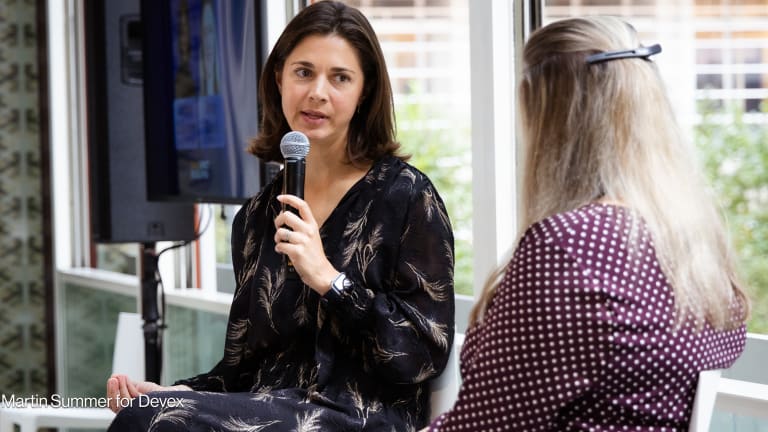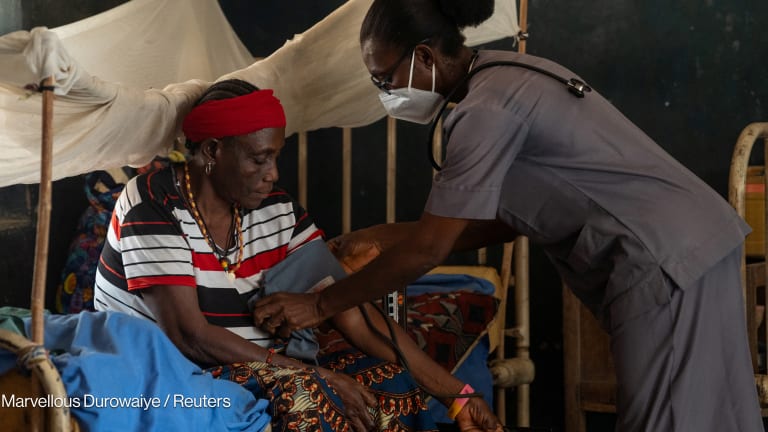UK NGOs want 'a new settlement' with government
Quick and heavy aid cuts have revealed U.K. NGOs' "vulnerability to government," and it's time for that to change, according to leaders at a Devex Pro event.
The United Kingdom’s international development sector needs to renegotiate its relationship with the Foreign, Commonwealth & Development Office and rethink its funding strategy after major cuts revealed the sector’s “vulnerability to government,” according to NGO leaders. The U.K. government has been making deep funding cuts in some areas after a sudden decision to reduce the amount it spends on international aid. Speaking at a Devex Pro event, NGO leaders said the way cuts have been made — with little transparency and at short notice — has exacerbated the damage. “INGOs [international NGOs] and others have been treated really, really, really terribly by the FCDO in the way that it has approached the cuts. … It’s a political choice, and there were many, many other ways that it could have been managed,” said Lorriann Robinson, the founder and director at The Advocacy Team. “If you care about sustainability and if you care about equity, then I would hope that this is the moment where INGOs say, ‘We will not be in this position again.’” --— Lorriann Robinson, founder and director, The Advocacy Team As NGOs reflect in the aftermath of cuts, “maybe one of the lessons is we became overreliant on that source of funding as a U.K. sector,” said Tim Boyes-Watson, global director of insights and influence at Humentum. The experts said this applies even more given the often difficult nature of government contracts. For example, they may lack full cost recovery, or funding for the overhead costs associated with delivering a project. This has given the government an “outsized” influence on the sector compared with how much funding it contributes, Boyes-Watson argued, because money from public supporters has to be used to leverage government funding for programs. In light of the cuts, the NGO leaders outlined two steps to ensure development NGOs are more resilient going forward. First, NGOs need to nurture alternative funding sources, including from their grassroots support bases. “In our whole sort of vulnerability to government ... we have perhaps, as a sector, neglected our grassroots engagement and those ... core supporters and not made sure that we are engaging them in the change that we are trying to make. … That has sort of undermined our fundraising capacity,” said Stephanie Draper, chief executive at Bond, a U.K. NGO network. Second, NGOs will need to renegotiate their relationship with government to create a more equitable dynamic and ensure that contracts have more safeguards built into them. “As part of a new settlement with government … we shouldn’t be taking money that doesn’t have full cost recovery, and we should be looking at … [issues such as] how easily they can cancel these contracts. … We need a kind of renegotiation of the power dynamics between us,” Boyes-Watson said. Robinson added: “I would really encourage INGOs to really think now ... about the sorts of funding contracts that they enter with donors. And some of that might result in some short-term pain, but if you care about sustainability and if you care about equity, then I would hope that this is the moment where INGOs say, ‘We will not be in this position again.’” Watch the full conversation on how NGOs will need to change after the COVID-19 pandemic.
The United Kingdom’s international development sector needs to renegotiate its relationship with the Foreign, Commonwealth & Development Office and rethink its funding strategy after major cuts revealed the sector’s “vulnerability to government,” according to NGO leaders.
The U.K. government has been making deep funding cuts in some areas after a sudden decision to reduce the amount it spends on international aid.
Speaking at a Devex Pro event, NGO leaders said the way cuts have been made — with little transparency and at short notice — has exacerbated the damage.
This story is forDevex Promembers
Unlock this story now with a 15-day free trial of Devex Pro.
With a Devex Pro subscription you'll get access to deeper analysis and exclusive insights from our reporters and analysts.
Start my free trialRequest a group subscription Printing articles to share with others is a breach of our terms and conditions and copyright policy. Please use the sharing options on the left side of the article. Devex Pro members may share up to 10 articles per month using the Pro share tool ( ).
Jessica Abrahams is a former editor of Devex Pro. She helped to oversee news, features, data analysis, events, and newsletters for Devex Pro members. Before that, she served as deputy news editor and as an associate editor, with a particular focus on Europe. She has also worked as a writer, researcher, and editor for Prospect magazine, The Telegraph, and Bloomberg News, among other outlets. Based in London, Jessica holds graduate degrees in journalism from City University London and in international relations from Institut Barcelona d’Estudis Internacionals.








